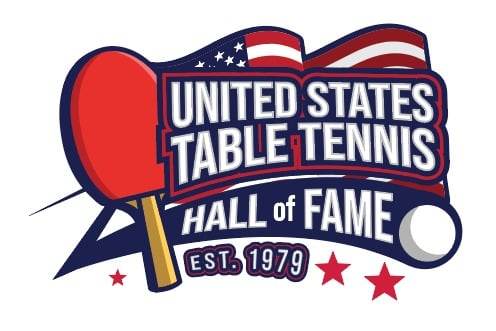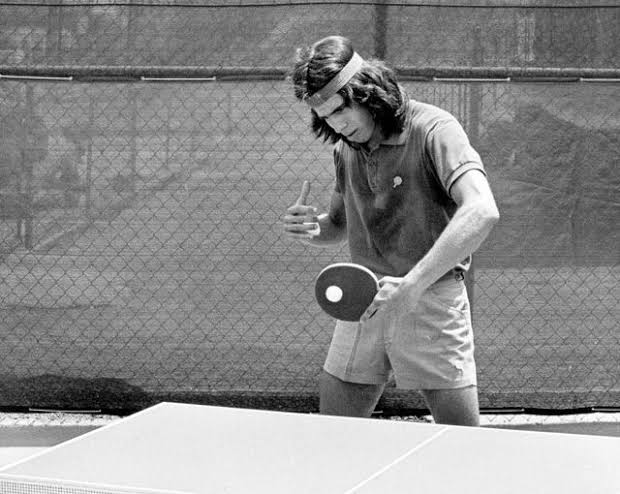Courtesy of Derek May – United States Table Tennis Hall of Fame – 2024 Induction Ceremony – October 10, 2024
Ladies and gentlemen, distinguished guests, and aspiring athletes:
It is my great honor to stand before you today to induct a truly remarkable individual into the US Table Tennis Hall of Fame. This individual was a great player, but his contributions to table tennis go far beyond the boundaries of table tennis, transcending sport to impact international diplomacy and leaving a permanent mark on history. That player is Glenn Cowan.
I never met Glenn. He retired from the sport years before I started playing. But the more I learned about him through reading articles and talking to people who knew him, the more in awe I became about what he accomplished in his relatively short table tennis career.
Like so many young people who get into table tennis, Glenn’s father, Phil, introduced the boy to the sport when he brought a ping pong table to their family home in New Rochelle, a suburb of New York.

According to Glenn’s mother, Fran, he quickly became “obsessed” with the sport of table tennis. Glenn’s parents supported his obsession, allowing him to compete all around the United States.
Young Glenn improved quickly. He took one of his first titles in 1964 – at age 12 – winning the under 13’s at the Eastern Regional Junior Championships.
Two years later, in 1966, Glenn and his Dad traveled to a tournament in Los Angeles and fell in love with the place. They successfully persuaded Glenn’s mother that they should move to Bel-Air. I would like to have been a fly on the wall during that conversation!
Relocating to Los Angeles accelerated Glenn’s table tennis trajectory. He was in high school at this point, but his table tennis education occurred at the Hollywood table tennis club. The 15-year-old Glenn played regularly with US table tennis legends Erwin Klein, a four-time U.S. singles champ, and Jack Howard, who would captain the US Team at the 1971 World Championships. More about this tournament later.
Glenn’s developing game combined excellent footwork with a deceptive, spinny loop.

Glenn’s arch-rival was John Tannehill, a talented junior from Cincinnati. The two teens met in many finals, helping to raise each other’s games. Cowan defeated Tannehill to win the 1967 US Junior Championships. He won the title again in 1969.
In 1967, Glenn’s father passed away. And around this time, Glenn began taking on his outgoing “hippie” persona, with long hair, tie-dyed shirts and bell bottoms. And the girls noticed!
“He was very good looking, with sparkling green eyes and a great smile,” said Pam Ramsey, a player from San Diego.
“Everyone had a crush on him,” said Olga Soltesz, an outstanding high school player from Orlando, Florida.
Patty Martinez Wasserman had a different perspective on the brash teenager, saying, “He was a sweet guy inside – genuine, honest, and innocent. But he had a crush on me.”
I digress…back to table tennis.
Glenn was a lefty, like Hall of Famer Del Sweeris. “Being a lefty, Glenn worked his way up through doubles much like I did,” Del recalled.

And that he did. Glenn teamed up with US Champion DJ Lee to win the 1969 & 1970 US Open Men’s Doubles Titles.
Glenn also had a strong showing at the 1970 U.S. Open Team Championships, which qualified him for the 1971 Worlds in Nagoya, Japan. It was at this tournament where Glenn found himself at the center of a moment that would change international relations forever.
It’s important to understand the backdrop: The relationship between the US and China at this time was marked by significant tension and hostility. After the establishment of the People’s Republic of China in 1949, the US did not recognize the communist government and instead supported the Nationalist government in Taiwan. The Korean War further strained relations, with China supporting North Korea against the US-led United Nations forces. Throughout the 1950s and 1960s, the US and China were adversaries in the Cold War, with limited diplomatic or economic interactions.
At the 1971 Worlds in Nagoya, the US Men’s Team was quickly eliminated after being defeated by Hong Kong and South Korea. China dominated the field, as expected. But as a side note, they did not win the Men’s Singles. That title was won by none other than Stellan Bengtsson, who is also being honored tonight.
After the US team was eliminated, the 18-year-old Cowan didn’t rest. Instead, he made a point of hitting with top-ranked foreigners to improve his game. One day, he stayed late and missed the bus to the hotel. The Chinese team allowed him to hop on their team bus.
On this ride, Glenn befriended Zhuang Zedong, the Chinese table legend and 3-time world champion. As a gesture of friendship, Zhuang Zedong offered Glenn a silk-screened tapestry.


At the next opportunity, Glenn reciprocated, presenting Zhuang Zedong with a t-shirt saying: “LET IT BE.” These gift exchanges were captured by photojournalists.
Chairman Mao, China’s ruler, saw these photos of Cowan and Zhuang Zedong and directed that the Americans be invited to China. In April 1971, nine players from the U.S. Table Tennis team – including 18-year-old Glenn Cowan – took an historic trip to China, becoming the first delegation of Americans to visit the country in decades. Their trip was the start of what became known as “ping-pong diplomacy,” and helped lay the groundwork for establishing official diplomatic relations between the United States and the People’s Republic of China.


The US players did not understand the magnitude of their trip at the time. Hall of Famer Connie Sweeris once remarked, “None of us knew what we were getting into until we reached the border and were surrounded by reporters.”
The tour featured several exhibition matches between the US and China in front of thousands of spectators, sight-seeing at the Great Wall, and a meeting with Chinese Premier Zhou Enlai.
During the meeting, Cowan asked the Premier what he thought of the “hippie movement in the United States.” Premier Zhou replied, “Youth wants to seek the truth, and out of this search, various forms of change are bound to come forth.” I am struck by the fact that this teenager had the courage to quiz the Chinese Premier.

Ping Pong Diplomacy’s ripple effect continued the following year, when the Chinese sent their table tennis team to the United States for an eight-city tour. And following the Chinese visit, President Richard Nixon traveled to the People’s Republic, which marked the first time in history that an American president had traveled to the Chinese mainland.
There is much more about Ping Pong Diplomacy that I could share, but I will stop here. I encourage you to take time to read about it online. One thing is for sure: If it weren’t for a long-haired, outgoing teenage hippie named Glenn Cowan, it likely would never have happened.

After returning to Los Angeles from the Ping Pong Diplomacy trip, Glenn was an instant celebrity, even appearing on Johnny Carson. Within a few years of Ping Pong Diplomacy, he enrolled at UCLA, became a teacher, and retired from table tennis.
Glenn died at 51 on April 6, 2004…which happened to be 33 years to the day that he and his teammates were invited to go to China.
It is with great pride that I hereby induct Glenn Cowan into the US Table Tennis Hall of Fame, forever enshrining his name among the legends of our sport. Let’s give Glenn Cowan a round of applause.
Glenn’s family cannot be here today, so I will accept the award on his behalf and make a few personal remarks. I’m primarily directing my comments to the young folks in the audience.
Here are my takeaways from Glenn’s table tennis career:
- There is no greater joy in sports than being part of a team.
In my table tennis career, I won several individual titles, but most of my greatest memories were team victories, including winning multiple US Collegiate Team Championships with my Augusta College teammates and winning a Men’s Team silver medal at the 1995 Pan American Games. I can only imagine the thrill Glenn Cowan and his US men and women teammates felt when they traveled to China for those matches in front of huge crowds!


- Surround yourself with people that help you “raise your game”:
Throughout Glenn’s career he showed a pattern of seeking out better players and excellent coaches to raise his game. In table tennis and life, it is critical to surround yourself with people who push you to be better.

- Build relationships:
Glenn Cowan had a special talent for meeting people and making friends. And his willingness to do so changed history. No one is successful in a vacuum. Don’t be afraid to meet people and build relationships – you never know where it may lead.

In closing, the history of table tennis is rich with stories of players like Glenn Cowan, whose impact goes beyond the table. I have no doubt that many of you will one day add your own chapters to this story.
Thank you.

